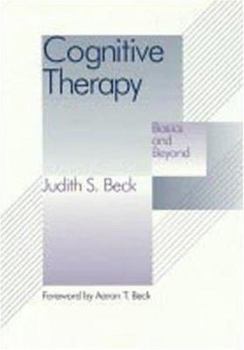Cognitive Therapy: Basics and Beyond
Select Format
Select Condition 
Book Overview
Hundreds of thousands of clinicians and graduate students have relied on this text--now significantly revised with more than 50% new material--to learn the fundamentals of cognitive behavior therapy... This description may be from another edition of this product.
Format:Hardcover
Language:English
ISBN:0898628474
ISBN13:9780898628470
Release Date:May 1995
Publisher:Guilford Publications
Length:338 Pages
Weight:1.48 lbs.
Dimensions:1.3" x 6.3" x 9.4"
Related Subjects
Behavioral Sciences Clinical Cognitive Psychology Compulsive Behavior Health, Fitness & Dieting Health, Fitness & Dieting Internal Medicine Medical Medical Books Medicine Mental Health Politics & Social Sciences Psychiatry Psychology Psychopathology Psychotherapy Psychotherapy, TA & NLP Social Science Social Sciences Social WorkCustomer Reviews
5 ratings
Excellent reference
Published by Thriftbooks.com User , 22 years ago
This is an excellent introductory source for anyone who is interested in learning Cognitive Therapy. I am a Master's level Professional Counselor in training, and therefore, needed to learn the basics of Cognitive Therapy. The book progresses from the basics of Cognitive Therapy to using advanced techniques. One of the greatest challenges for a Cognitive Therapist is to "teach" the client how to practice Cogntive techniques on their own. Dr. beck does a great job of explaining the rationale, as well as ways to empower the client to be their own therapist.
Excellent book for the literate patient
Published by Thriftbooks.com User , 23 years ago
I was introduced to cognitive therapy by a therapistwho recommended David Burns's popular "Feeling Good Handbook". That is certainly a good book to start with,but I wanted to learn more so I went to a bookstore andfound this book by Judith Beck. It is actually a textbookfor therapists and is not addressed to patients at all.Nevertheless I have found it very useful because it ismuch more structured than Burns's books. I particularlyfound her schema of automatic thoughts (also found in Burns), intermediate beliefs and core beliefs (the lattertwo not found in Burns) to be very helpful. My personal conclusion is that Burns's less disciplined approach isprobably helpful for simpler kinds of problems, whereasBeck's formalism is going to be more relevant once you discover that you want or need to get down below thesurface. The strength of Burns's book is he provides lots of exercises. Since Beck's book is a text forthe therapist, it does not have exercises for the patient reading it as self help. If you are reasonablydedicated you can (and must) create your own exercises.If you think you can make that bridge from text toself help, then this may be a good book for you.[ By the way, I think that Burns's discussion ofcommunication techniques in his "Feeling Good Handbook"is the single most useful treatment of that subject Ihave found for the single person (he doesn't consider how committed couples can work on their communicationissues together, but there are lots of couples books for that).]
Basic Training Manual
Published by Thriftbooks.com User , 24 years ago
When I first heard Judith Beck had written this book I expected she was simply riding her fathers coat tails. Her father Aaron Beck is often considered the father of cognitive therapy. Judy has established herself however as an important contributer to this field in her own right. This book is now required reading for begining cognitive therapists going to the Beck Institute for training. It covers all the important points in doing cognitive therapy with a range of disorders and is the logical place to start for the neophyte therapist and a good place to return for the experienced therapist to clarify what needs to be done if you are going to call it cognitive therapy.
One of the best, basic how-to books on cognitive therapy
Published by Thriftbooks.com User , 26 years ago
This is a superb book for therapists - experienced or novice - on the how-tos of doing cognitive therapy. It steps the reader through the basics, covers potential problems (from both client and therapist perspectives), provides advice on treatment planning and lists references for additional information on this effective form of therapy.
Excellent book for clinicians learning Cognitive Therapy
Published by Thriftbooks.com User , 28 years ago
A concise and comprehensive book that provides a basic understanding of cognitive therapy written by one of the leading cognitive therapists. Written with the beginner in mind, it is the only book I have found that provides specific instructions in actually DOING cognitive therapy with clients. Beck takes the reader from the initial session, through case conceptualization, specific interventions, to terminitation. There is even a section on trouble-shooting that is especially useful for students who may have little experience. One of the greatest benefits of the book is that it is written like a manual that beginners can use as a foundation for developing their own style of therapy. If you are a graduate student in a clinical training program, you should have this book whether you conduct cognitive therapy or not.






